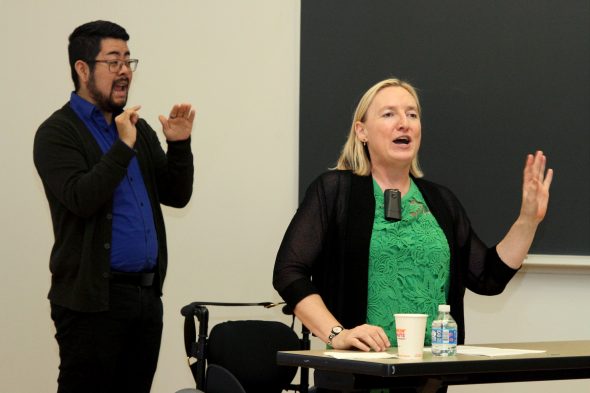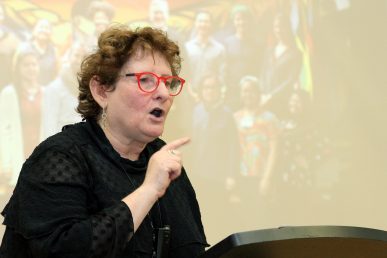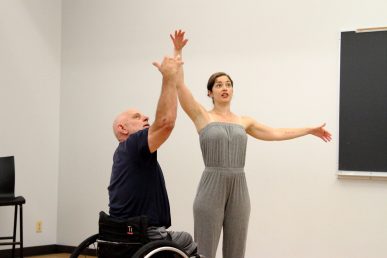Disability Cultural Center celebrates opening

Carrie Sandahl, associate professor of disability and human development, presents a talk on disability culture at the opening of the Disability Cultural Center. (Photo: Jenny Fontaine)
UIC’s Disability Cultural Center celebrated its opening Sept. 11 with a program that featured a talk on disability culture interspersed with arts performances from Chicago artists who have disabilities.
The Disability Cultural Center, housed in Room 1-461 in the Daley Library, is the newest member of UIC’s Centers for Cultural Understanding and Social Change.

“We are creating a community respectful of all forms of diversity,” says Roxana Stupp, director of the Disability Cultural Center. (Photo: Jenny Fontaine)
“The opening of the new Disability Cultural Center marks a turning point for the UIC community and indeed for the disability community on campus and in Chicago,” said Roxana Stupp, director of the Disability Cultural Center. “UIC joins a select group of pioneer public universities that have acknowledged the place of disability within the institutional framework of diversity.”
The cultural center aims to change the conversation on disability by breaking down stereotypes and stigmas, as well as helping others think about disability through the lens of human diversity, human rights and social justice, Stupp said.
“We are creating a community respectful of all forms of diversity,” she said.
Before the cultural center opened its doors, disability cultural programming was organized by the Disability Resource Center, which provides accommodations and access to all students who have disabilities. But there was a need on campus for more focus on disability cultural programming — including a budget, staff, resources and space, said Amalia Pallares, associate chancellor and vice provost for diversity.
The center will “help shape how disability is understood and defined on the campus and in the broader community,” she said.
UIC faculty, staff and students who have disabilities were central in creating the vision for the new center, she said.
“We thought their voices should be shaping the direction that the center takes,” Pallares said.
Carrie Sandahl, associate professor of disability and human development, presented a talk on disability culture and introduced dance, music and spoken word performances by artists who have disabilities.
She noted UIC’s leadership with the field of disability studies, including launching the first doctoral program in the country in 1997 and beginning an undergraduate program in disabilities studies two years ago, which has 1,000 currently enrolled, she said.
“Now that the Disability Cultural Center is its own entity, I feel like it’s another new beginning and opportunity,” she said. “We take our place among the other minority cultures on this campus.”
Disability culture encompasses the experience of a diverse group of people who share similar experiences — creating a conversation on “what is more true to our experience; not promulgating narratives of inspirational overcoming or pity,” Sandahl said.
Disability art often mirrors those themes, she said.
“You see often a challenge to stereotypes and a focus on the lived experience of the disability, especially the parts that are hidden or stigmatized, and show them in a different way,” said Sandahl, who also directs Chicago’s Bodies of Work, a network that supports the development of disability arts and culture. “A lot of times there’s engagement with political issues, insistence on belonging, a claiming of space.”
Timotheus “T.J.” Gordon Jr., a master’s student in disability and human development at UIC, shared two poems during the opening celebration. Gordon, an autistic self-advocate, focused one poem on the importance of having a cultural center.
“Why we need one? We need more than just accommodations, we also need a community,” he said.
The Disability Cultural Center has a list of upcoming events on its website, including a series of “Disability Page Turners” reading conversations and informal talks on issues related to disability, culture and identity.
The Disability Cultural Center is open from 9 a.m. to 5 p.m. Monday through Friday, Room 1-461 in the Daley Library. Students who need accommodations should visit the Disability Resource Center from 8:30 a.m. to 5 p.m. in 1190 Student Services Building.

